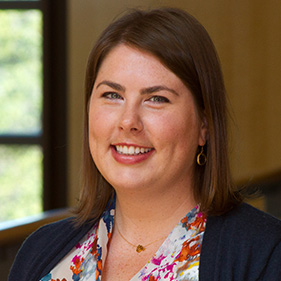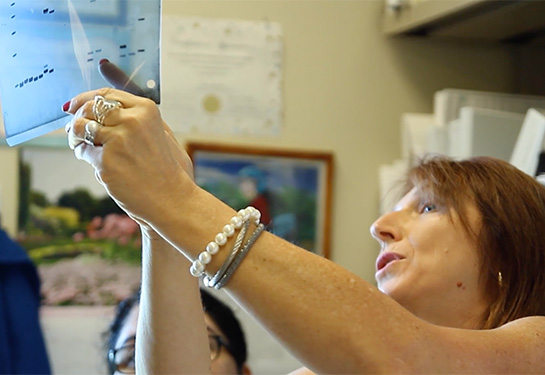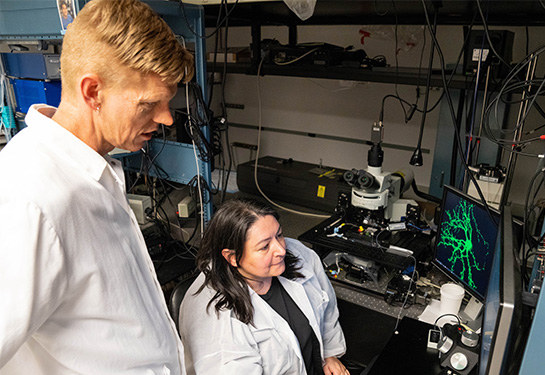Can telehealth assessments identify infants more likely to be on the autism spectrum?
$3.2 million federal grant will fund national study that could lead to earlier intervention, better access to care
Is it possible to identify infants more likely to be on the autism spectrum through telehealth assessments? The UC Davis MIND Institute’s Meagan Talbott, an assistant professor in the Department of Psychiatry and Behavioral Sciences, has received a $3.2 million grant to seek the answer to that question. The five-year grant is from the National Institute of Child Health and Human Development.
Talbott is now recruiting for a national study of 120 infants, 6-12 months of age, who are showing delays or differences in their development. Parents might have questions about autism or other conditions, but not necessarily.
“Right now, we don’t have very good tools to tell us whether these differences might be related to autism, developmental delays or are likely to resolve on their own,” she explained. “This means that many families are told to ‘wait and see.’”
She notes that often, families wait months or even years for specialized evaluations, leaving them in limbo and without resources.
“We hope that by closely following many infants with these kinds of early concerns or questions we can help identify when early behavioral differences indicate that a child may be more or less likely to have certain outcomes. This will help us develop better supports for families during this early period before they may have received a specific formal diagnosis,” Talbott said.

How the study will work
Talbott’s team will do a series of four hour-long telehealth assessments over the course of a year with each family, and an additional assessment when the child is 3 years old. The first four sessions will involve activities like playing with toys, peek-a-boo, bubbles, tickles and reading a book. The researchers will also ask caregivers questions to learn more about the child’s development. The final assessment will include different activities geared to the toddler’s age, as well as questions about life skills like potty training, getting dressed and eating on their own.
“Understanding what, if any, factors predict these developmental skills will help us provide better feedback and supports for families in the future,” Talbott said.
Talbott’s team will mail families a small kit of toys and other materials and can offer families an iPad to use, if needed. They’ll also schedule a 15-minute practice session and ask families to fill out questionnaires about the child’s development.
All families will receive written reports summarizing each telehealth visit, as well as $50 for each infant visit and $100 for the final toddler visit.
Researchers will track what kinds of support parents prefer to use for the telehealth sessions and caregiver satisfaction with the study. They’ll ask for feedback after each session to ensure the methods are working well.
Telehealth offers the opportunity to reach more families with early questions or concerns, so that we can learn more about when these early developmental differences are likely to resolve and when they indicate a child is more likely to be on the autism spectrum. This can help us connect families with the right services sooner.”—Meagan Talbott, professional researcher, Department of Psychiatry and Behavioral Sciences
Telehealth may help overcome challenges faced by previous autism studies
In the past, it has been challenging to recruit enough infants with early behavioral differences near a research site to answer developmental questions through traditional in-person studies. Because of this, most studies of early development in autism have focused on the younger siblings of autistic children, who are more likely to develop autism than other children.
Although about 20% of these siblings will be identified as autistic by the time they are 3 years old, Talbott points out that very few show clear behavioral differences in the first year of life from infants who are not later diagnosed as autistic.
“Unfortunately, we still know very little about the outcomes of infants who have early behavioral differences,” Talbott explained. “Telehealth offers the opportunity to reach more families with early questions or concerns, so that we can learn more about when these early developmental differences are likely to resolve and when they indicate a child is more likely to be on the autism spectrum. This can help us connect families with the right services sooner.”
One challenge the research team faces is that families may not be sure whether their child is experiencing delays in their development or may not know what questions to ask their doctor. That’s why Talbott aims to include families who have both very specific concern and those who may be unsure. The researchers will complete a developmental screening as part of the study and families can share that information with their pediatrician or other provider.
How to sign up for the study
- Talbott’s team is recruiting infants 6-12 months of age whose caregivers have specific or general concerns or questions about their development, including social communication or language skills.
- Infants should be able to sit up with help and hold toys.
- Call 916-848-7670 or email HS-tedistudy@ucdavis.edu
Funding
In addition to the funding from the National Institute of Child Health and Human Development, the project was supported by the National Center for Advancing Translational Sciences, National Institutes of Health (NIH) grant UL1 TR001860 and linked award KL2 TR001859, and NIH grant 5KL2TR001859-07, and the MIND Institute Intellectual and Developmental Disabilities Research Center, funded by NIH grant P50HD103526.
Related Resources
- Study website
- MIND Institute Research Participant Registry (This database matches potential participants with research studies)
- Study suggests telehealth screening of some infants could aid in early autism support
The UC Davis MIND Institute in Sacramento, Calif. was founded in 1998 as a unique interdisciplinary research center where families, community leaders, researchers, clinicians and volunteers work together toward a common goal: researching causes, treatments and potential prevention of challenges associated with neurodevelopmental disabilities. The institute has major research efforts in autism, fragile X syndrome, chromosome 22q11.2 deletion syndrome, attention-deficit/hyperactivity disorder (ADHD) and Down syndrome. More information about the institute and its Distinguished Lecturer Series, including previous presentations in this series, is available on the Web at mindinstitute.ucdavis.edu.






